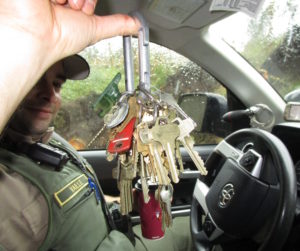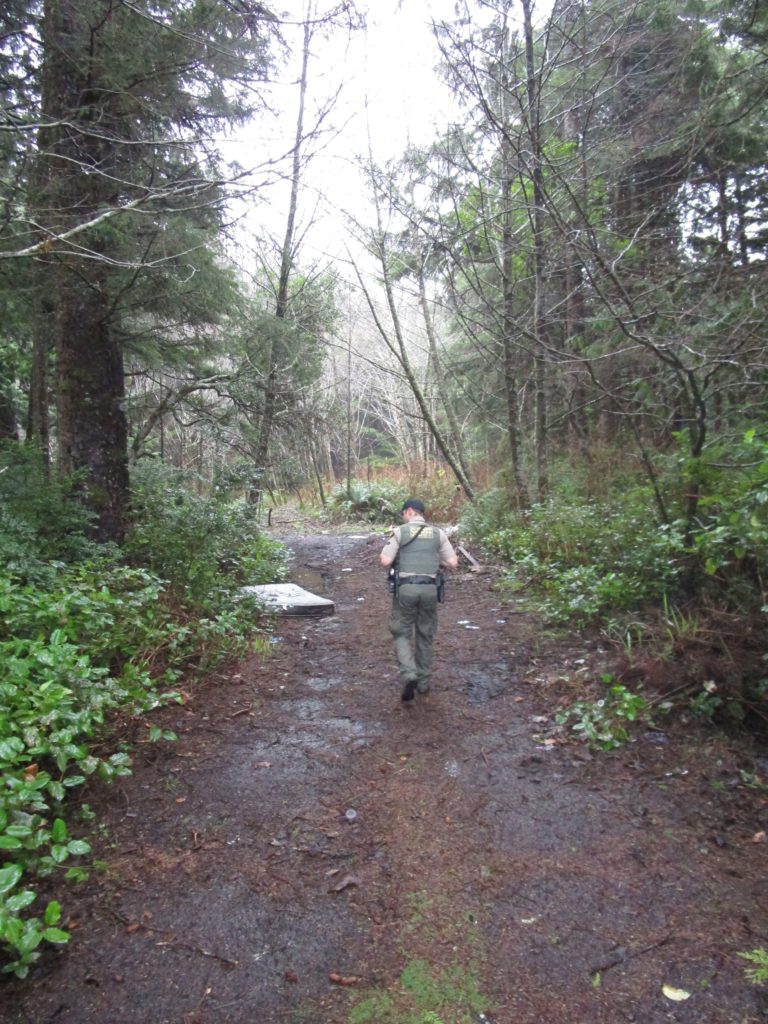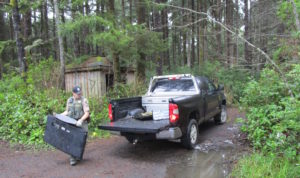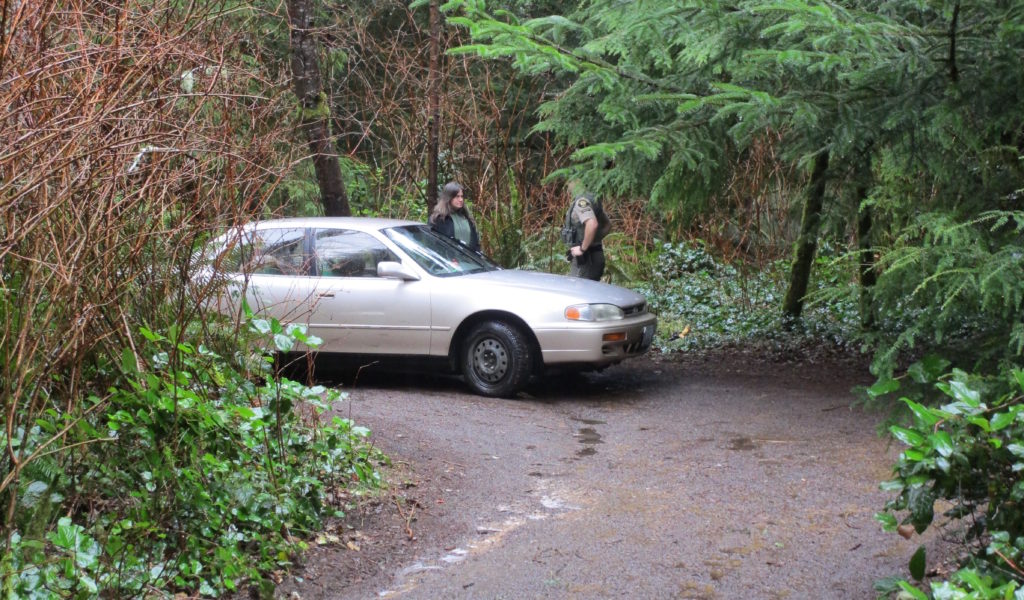
By QUINTON SMITH/YachatsNews.com
Lincoln County Sheriff Deputy Nick Vaille is only a few miles up the Yachats River when he takes a hard left, aiming his truck up a steep, one lane Forest Service road.
For the next three hours Vaille will rarely touch pavement as he winds along gravel roads patrolling public forests and private timberland in south Lincoln County.
Aside from the occasional sighting of a U.S. Forest Service vehicle, the Lincoln County Sheriff’s lone forest patrol deputy is on his own deep in the thousands upon thousands of acres of trees, stumps, brush, creeks and canyons east of Yachats.
Although vastly different from most deputies’ patrol work, it’s serious stuff.
Vaille’s Toyota Tundra pickup has a winch in its bed, a bench seat for suspects in the back, a dashboard camera and two electronic mapping systems to help him from getting lost – or finding his way home when he does. He wears the usual police equipment — body armor, handgun, Taser and chest-mounted body camera.
The sheriff’s office has had a forest deputy since 1994; Vaille, 34, is into his second year.
Initial instructions: “Get out there. Don’t hurt yourself. Don’t run out of gas,” he says only half-jokingly.

Vaille’s job is to show a law enforcement presence in the 475,000 acres of private and public forests of Lincoln County. That means, for example, seeing if commercial pickers have permits, checking logging equipment during the weekends, finding, reporting and arranging cleanup of illegal dumps, and to make sure campers – increasingly homeless — are obeying the rules.
The forest deputy position is partly funded by garbage fees, timber companies, a small Forest Service contract and an Oregon Fish & Wildlife grant. Similar positions exist in Benton, Hood River, Deschutes and a scattering of other Oregon counties.
Because there is so much private timberland in the county, Vaille must also keep straight laws and ordinances that change simply when someone moves from public onto private property.
Vaille stays in radio contact with dispatch to let someone know when he’s checking on a camp deep in the woods, or to run license plates, check names or serial numbers. But otherwise any backup is miles and miles away.
“You are very much out here by yourself,” Vaille says. “There’s just so much land and so few of us out here.”
A push from landowners
The forest deputy position started in 1994 after forest landowners, upset about law enforcement cuts and declining rural patrols, banded together to form the Association of Concerned Landowners in Lincoln County. About the same time voters approved forming the Lincoln County Solid Waste District funded by fees collected from three garbage haulers.
Both groups wanted forest patrols.
While the sheriff’s office provides the vehicle and equipment, the deputy’s cost and expenses – currently about $91,500 a year – are paid by the solid waste district. The landowners group contributes $45,000 to that; another $35,000 comes from the ODFW grant.
“Although it’s been a very successful program, we’ve had to work hard to piece funding together,” said Mark Saelens, manager of the solid waste district.

Problems in the forest have changed over the years, said Joe Steere of Siletz, chair of the 13-member landowner group, which collects money based on timber acreage. The biggest problems used to be timber theft and marijuana growing. Now, Steere said, it’s illegal dumping and trespassing.
“A lot of it is a deputy working with the district attorney’s office so when there is an issue it can get prosecuted,” Steere said. “It also helps people recognize that there’s more to Lincoln County than what’s west of Highway 101.”
Saelens is afraid that rising dump fees and new rules making it harder to dispose of asbestos will increase problems in the forest. He foresees hiring a special contractor to clean up dump sites and disposing of RVs, which also has become more difficult and expensive.
Deep in the woods
Vaille works four days a week, 10 hours a day. He is also the medic for the sheriff’s SWAT team and an assistant for search and rescue.
He put 23,000 miles on the truck last year and his goal is to be out in the forest for the bulk of his week. He coordinates and sometimes shares the cab of a truck with Forest Service cops. From his time as a patrol deputy he also knows that problems around Waldport, Newport and Lincoln City often spread into the forest.
One of the electronic maps on his phone keeps track of where he’s driven, so he can be sure to cover the county evenly. Another device shows him minute details of roads, property lines and who owns what.
When he drives, Vaille looks carefully at the gravel or dirt on the road, especially smaller paths leading deeper into the woods. Are there tracks; what’s the age of the track; is the trail being used regularly?

It’s 10:30 a.m. when Vaille stops to check an abandoned shack and dump site off Dick’s Fork Road north of Yachats. There’s scattered drug paraphernalia, household waste, a king size mattress – and two flat screen TVs among the mess. He radios in to check serial numbers on the TVs, on the off-chance they’re from a recent Yachats burglary. But the numbers aren’t recorded so he tosses them in the back of the truck to haul away.
Vaille, who started his career as a wildland firefighter in Josephine County, said patrolling forests as a cop “definitely changes your perspective.”
“You see things differently,” he said. “Is this person using the land responsibly … and are they using the land legally?”
Shortly after that stop, Vaille turns down a power line service road. Brush scrapes the side of the truck and it dips and dives down the narrow track. Some 200 yards later a large motorhome appears; it’s been driven down the same road to be dumped, trashed and shot up. Vaille knows who the owner is and also knows the man doesn’t have $1,500 to get it removed. He’ll ask the Forest Service to get a judgment against the owner, get it pulled out and maybe paid off some day.

A half hour later Vaille turns off Highway 34 east of Waldport to check on a campsite he and a Forest Service officer spotted the previous day. He’s halfway up a one-lane path when he stops to call dispatch “so they know where I’m at.”
“’We’re going to make contact with some campers up here’,” he radios.
A sedan full of stuff is parked off the road. Down a logging trail are two large tents constructed of tarps and poles. A woman emerges; Vaille knows her from his time patrolling Waldport. He runs her driver’s license and finds a warrant for failing to appear in a Linn County court. He cites her, giving her a date to show up in Albany.
Vaille is friendly and not confrontational, even when a boyfriend appears from of the tent.
“Can I ask why you came up here,” the boyfriend asks.
“Forest Service asked me to,” Vaille replies.
Vaille compliments the couple on their campsite’s cleanliness and reminds them that with a permanent address they can camp on Forest Service property for two weeks.
“The Forest Service is probably going to want you to move along,” he says.

As he leaves, Vaille explains that he tries to start most situations calmly.
“I didn’t come in there hootin’ and hollerin’,” he said. “It’s all in the approach.”
Vaille admits that he’s learning the way of the woods. The last forest deputy, Gary Davey, had the job for eight years and knew territory in detail.
“I’m a year in and I’m learning all the time,” he said. “There’s a little bit of luck involved and a little bit of planning. But I think if you want to be a good cop you’ve got to be curious.”
It’s a little after 12 noon when Vaille realizes that he’s not where he thought he was. He stops, checks both maps and decides to keep plowing ahead.
“Yes,” he grins, “I’ve gotten lost. I’ll just keep going until I find my way out.”



